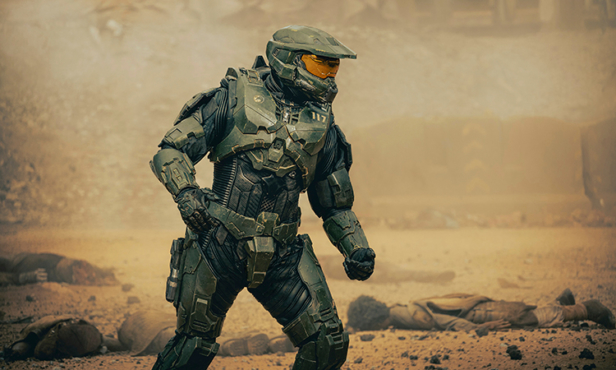Way back in 2001, Halo: Combat Evolved immediately captured gamers around the world when it was released on Xbox, becoming one of the console’s most popular games. Telling the story of the conflict between humanity and a variety of alien species during the 26th century, the game has spawned 15 sequels (both as part of its main storyline and offshoots), as well as novels, graphic novels, comic books, short movies, animated movies and feature films.
Now the franchise has its very own series, starring Pablo Schreiber as one of humanity’s best defences against the powerful Covenant alien race. Schreiber plays Master Chief Petty Officer John-117, a genetically engineered super soldier who are known as Spartans 117. Though you might know Master Chief as the guy’s hand you’re moving when playing him in the videogame.
For Schreiber, playing the iconic character wasn’t as daunting as it may seem… “I think maybe I was a little naive getting into it,” he laughs when we sit down to discuss the series. “It didn’t feel that daunting when I got into it, I was just really excited.”
That doesn’t mean to say he didn’t know about Halo at all, just that he perhaps didn’t know the scope of this world. “I had some experience playing Halo in my college years,” he nods, “so I had a peripheral relationship with it. I’d never played it in story mode or campaign mode – I only knew it as this first-person shooter challenge game where you can go in and shoot your buddies!
“So the process for me of getting the job and then learning about it was getting exposed to this treasure trove of mythology and story that has been established over the past 20 years. I just immediately fell in love with this world, this universe. And obviously the opportunity of getting to play such an iconic character as Chief.”
Iconic is right. Even if you haven’t played the game, we’re sure you’ve seen Master Chief’s (and the Spartans’) distinct suit of Mjolnir armour, and for Schreiber, wearing it for the first time is a moment he won’t be forgetting in a hurry: “It was amazing to feel it for the first time. It was a multi-step process because the suit was built by a London company called FBFX and I had to go to London about five or six times before we shot to try on different iterations of the suit as they worked on it. They did an amazing job. Unfortunately for those first few times that we tried stuff on, it wasn’t painted, it didn’t have any of the patina or veneer that made it feel real. It was just grey hunks of plastic. So it definitely built up in the anticipation and the feeling of it.
“But when it was all done, I remember the moment. Most of the crew had not seen it. They kept the suits away from the crews and about a week or two before we started shooting, they had this moment where they brought the four Spartans out, all dressed up in their suits in front of the whole crew – and our crew is probably about 600 strong on any given day! We kind of marched out in front of them and just to see the reactions on people’s faces… So many people had waited so long for this thing because it was gestating for a long time in development. So it was a big moment and just continued on from there.”
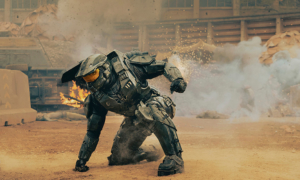
It’s a bulky piece of kit both in real life (“physicality was definitely a huge part of the process!” Schreiber says of wearing the suit) and in the game. You see, not just anyone can wear Mjolnir armour – only the Spartans have the strength and reflexes to wear it. That’s because the Spartans have been genetically modified to be physically, genetically, technologically, and mentally superior in order to work as special fighting units.
In the series, the Spartan project has been helmed by Dr Halsey (played by Natascha McElhone), who has hand-picked children to be taken from their homes and sent to a special facility to train to become Spartans from that young age. As to her moral standing, well, that’s to be decided as the series progresses… “What I found really compelling about the character was this idea that it’s someone who… sees life as we don’t yet know it,” McElhone tells us. “It’s a way of thinking about what we in our moral universe can’t yet conceive of. So a time in which perhaps the sacrifice of what she sees as a few people in the short term will benefit the survival of humanity. If you’ve got a sort of utilitarian approach to life, which I think she has, she’s upscaling a feeling that you might have for a child or a mother, but to the whole of future generations, of humanity. She deems that to be a lot more important than just one personal familial relationship.
“It was an interesting moral conundrum, and also, morality, I suppose always lags behind technology, doesn’t it?” she continues. “Even now, we’re scrambling to find checks and balances to how AI might compromise our decisions. But the technology is already there. We’re having to catch up with it. So I think that’s interesting in terms of the creation of Cortana…”
As, yes, Cortana. As our handy guide into the world of the Halo in the videogames, it’s no wonder the series had to include the character too. In this instance Cortana (played by Jen Taylor, who reprises her voice role from the game and provides motion capture for the character) is an AI construct modeled on the brain of Dr. Halsey and implanted in the brain of Master Chief as a means of influencing his decisions to control him and cement him as the ultimate weapon.
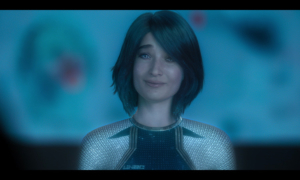
That’s not the only insight into Master Chief. In fact, rather than focussing on the Halo world as a whole, the series centres its story around Master Chief himself – both as a Spartan and as a person, delving into his history as he tries to make sense of who he is and where he’s come from.
Many fans were surprised when images circulated the internet of Master Chief without his helmet on as his face has never been revealed in the games, but the intention was always to bring attention to this character as a person.
“Season One [of Halo] is really the process of breaking down the symbol of Master Chief,” Schreiber reveals. “Chief for the gamer is basically an avatar for himself. He’s a stand in where the character is created in an opaque and distant way so that you can fill in the subtleties of his personality with your own. So to make a TV show about a character like that, we felt it was important to break that relationship with the audience, the relationship that the audience has to the Chief, break that early on.
“So it was important to get the helmet off early, and to really establish him as a human being underneath all of this armour. The journey of the first season is Chief discovering some of his history and discovering for the first time what it feels to be human. By the end of the first season, I think we’ll be in a place where we can take him forward into different and interesting storytelling adventures, with what we’ve established from there.”
Chief isn’t the only character just on the beginning of his journey. McElhone certainly hopes to continue to dive into Halsey’s complex psyche in further seasons… “We did a lot of delving into what her backstory might be,” she tells us. “TV shows… some of them intend to run for maybe five seasons, seven seasons. So you’ve got to plant the roots quite deeply in order to make sure that you’ve got some good growth and have the soil as it were.
“If you were not thinking deeply about what her motivation is, what her worldview is, what her aspirations are for humanity, why she did what she did with all of the augmentations of the Spartans and so forth, then we’re going to be just going around on a hamster wheel, repeating things which I hope we never do. I think there’s so much scope for deep, rich storytelling. Honouring the game and that fan base as much as possible.”
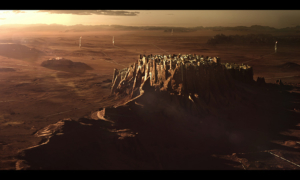
As a beloved game spanning 20 years, it’s no wonder the Halo franchise has a dedicated and passionate fanbase, and after an unsuccessful attempt at a Halo film (that was rumoured to have been produced by Peter Jackson no less), fans have been vocally frustrated by the lack of a live action adaptation of the game.
“I was warned that there were many opinions about Halo [and] when I was cast I definitely got a sense of the importance for so many people and the passion,” Schreiber continues. “But it wasn’t till it came out that I really felt how huge this was for so many people. How excited so many people were to get to have this as a live action show finally after so long.
“There’s a lot of frustration for the past few years from a certain sector of the community and I respect that. I respect everyone’s feelings about how they experience this show or whatever their feelings are about it. For me, I can’t do very much about past trauma or frustrations from certain sects of the fanbase. There’s a certain group of people that I don’t know will ever get on board and that’s totally fine. Everyone has their own opinion, and they’re totally entitled to it.
“For me, the real blessing of the journey has been hearing from so many people who are long-time Halo fans, who have loved this universe for so long and are just so excited to finally see it in live action and have been able to sit down with their wife who was never interested in Halo or their kids, and expose them to this universe that they love and have loved for so long. So, for me that’s the payoff, the reward is getting to expose this universe that I have loved, and fallen in love with so much, to a whole new group of fans and for the people who have loved it and waited for it and those that are enjoying it, for everybody to really have this moment is very exciting for me.”
Live-action videogame adaptations have certainly had a rocky past but as the cast of this particular adaptation stress, this is a TV show, not a videogame, and therefore differences in the storytelling have to be expected. “I think the big thing that makes this a satisfying experience for consumers – be it gamers or a television audience – is the larger themes of Halo,” Schreiber says. “The larger themes of Halo are based around hope, human resilience, humanity struggling against an existential crisis coming together and defeating it, and the nature of heroism. Those are the larger themes of Halo that I think really reward the gamer and that we want to remain an absolute cornerstone of the television show.
“The gaming experience and a long form TV show are incredibly different mediums. So the way you go about telling the story and the way you go about interfacing with an audience has to necessarily be different. But I think those larger themes are the things that unify the two experiences and carry them through.”
“You’ve got this wonderful world in which you can dive into all these different arenas and not get bored,” McElhone adds. “You’ve got enough characters and enough different universes to explore and to cut in and out of because I guess in a game, your attention span is constantly being fed. There’s a lot of excitement and it’s high octane and it’s adrenaline. So I guess for the TV show that will be the challenge to make sure that it stays as buoyant and as exciting and as fast-moving.
“Sometimes when you’re trying to go into the backstory of the character or to give an explanation for their motivation, then that’s going to carry another two episodes of the story. There’s a bit of investment to be made there. Obviously, if this game, if the story has been mostly on a console, people are going to get impatient with the slightly more in-depth look at these characters, but for them to sustain themselves on TV it’s a necessary process.”
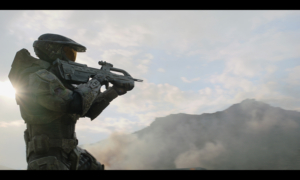
When Bungie first developed their first-person shooter game for some console called an Xbox, we’re pretty sure they weren’t expecting for their story to still be going strong two decades later. The fact that fans have such a strong reaction to their beloved franchise is a testament to its creators and now, a generation later, that fundamental aim to entertain people is what the cast of the show is looking to continue.
“In terms of lasting for 20 years and why it’s been so successful, I think that comes down to the depth of the story and the depth of the mythology,” Schreiber concludes. “What these artists who created this starting with Bungie and now 343 (who have taken over the mantle) – they are responsible for creating this treasure trove of story and mythology [and] it has kept this very loyal and passionate fan base interested in this world for 20 years because of how detailed and beautiful this story is.
“At the bottom of everything I want people to be entertained,” he continues on what he hopes audiences will take from the series. “At the end of the day we’re making entertainment and I want them to feel transported. The beauty of sci-fi is that you’re allowed to travel to these distant lands and universes that we can only imagine. You get to leave the physical laws of this world that we’re hamstrung by and we get to leave those behind and we get to dream for a little bit. So I hope it’s a fascinating and incredible dream for people who love the universe and who have loved it for a long time. And for people who are coming to it anew, I hope it’s the same.”
Halo episodes 1-3 will drop as a binge for the Paramount+ launch on 22 June 22 and then a new episode will drop weekly on Wednesdays on Paramount+.
